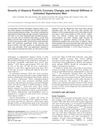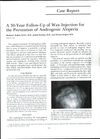 4 citations,
September 2015 in “Case Reports”
4 citations,
September 2015 in “Case Reports” A man fainted and felt unwell after using a strong hair growth product, but got better when he stopped using it.
 418 citations,
June 2003 in “Endocrine Reviews”
418 citations,
June 2003 in “Endocrine Reviews” While PCOS might increase the risk of heart disease, there's not strong evidence to prove it causes earlier heart problems.
 104 citations,
March 1987 in “Journal of The American Academy of Dermatology”
104 citations,
March 1987 in “Journal of The American Academy of Dermatology” Minoxidil helps hair growth in 63.6% of alopecia patients, with 27.3% having excellent results.
 100 citations,
March 1973 in “American Journal of Cardiology”
100 citations,
March 1973 in “American Journal of Cardiology” Minoxidil effectively lowers blood pressure without major side effects.
 86 citations,
September 1977 in “BMJ”
86 citations,
September 1977 in “BMJ” Minoxidil effectively controls blood pressure in severe cases, but has serious side effects and causes hair growth in women.
 40 citations,
February 2005 in “Fertility and Sterility”
40 citations,
February 2005 in “Fertility and Sterility” Some women with PCOS have CYP21 mutations and IRS1 variants, but these genetic factors are not major contributors to PCOS.
 35 citations,
July 1981 in “Clinical Pharmacology & Therapeutics”
35 citations,
July 1981 in “Clinical Pharmacology & Therapeutics” Minoxidil can cause dangerous fluid buildup around the heart.
 33 citations,
November 1994 in “Archives of Biochemistry and Biophysics”
33 citations,
November 1994 in “Archives of Biochemistry and Biophysics”  28 citations,
January 1989 in “Toxicologic Pathology”
28 citations,
January 1989 in “Toxicologic Pathology” Minoxidil may cause heart changes; use caution and monitor patients with heart conditions.
 26 citations,
April 1984 in “The American Journal of Surgery”
26 citations,
April 1984 in “The American Journal of Surgery” Gastric exclusion surgery caused major weight loss and health improvements but led to some anemia and vitamin deficiencies.
 26 citations,
October 1978 in “JAMA”
26 citations,
October 1978 in “JAMA” Minoxidil helps treat severe high blood pressure.
 25 citations,
February 1989 in “The Journal of Clinical Pharmacology”
25 citations,
February 1989 in “The Journal of Clinical Pharmacology” This document studied minoxidil in healthy volunteers. Minoxidil is quickly absorbed and eliminated from the body.
 21 citations,
October 1978 in “The Journal of Clinical Pharmacology”
21 citations,
October 1978 in “The Journal of Clinical Pharmacology”  19 citations,
March 1990 in “Journal of Cardiovascular Pharmacology”
19 citations,
March 1990 in “Journal of Cardiovascular Pharmacology” Minoxidil affects rat fluid dynamics, altering pressure and circulation, improving blood flow and hair growth.
 19 citations,
May 1979 in “Archives of internal medicine”
19 citations,
May 1979 in “Archives of internal medicine” Minoxidil effectively lowers blood pressure and initially increases plasma renin activity without raising aldosterone levels.
 17 citations,
December 2001 in “Dermatologic therapy”
17 citations,
December 2001 in “Dermatologic therapy” Different treatments for alopecia areata have unpredictable results and varying success rates.
 17 citations,
May 1975 in “Clinical Pharmacology & Therapeutics”
17 citations,
May 1975 in “Clinical Pharmacology & Therapeutics”  17 citations,
April 1975 in “The Journal of Pediatrics”
17 citations,
April 1975 in “The Journal of Pediatrics” Minoxidil effectively controls severe high blood pressure in children with few side effects.
 15 citations,
December 2016 in “Revista Da Associacao Medica Brasileira”
15 citations,
December 2016 in “Revista Da Associacao Medica Brasileira” Polycystic ovary syndrome is a common hormonal disorder in women, linked to increased risk of metabolic and heart diseases, and needs more research for better understanding and treatment.
 14 citations,
January 2006 in “Skin pharmacology and physiology”
14 citations,
January 2006 in “Skin pharmacology and physiology” Procyanidin compounds from apples and barley promote hair growth and prevent hair cell death.
 11 citations,
January 1987 in “Dermatology”
11 citations,
January 1987 in “Dermatology” Minoxidil works for 56% of balding men with specific criteria.
 6 citations,
January 2016 in “Skin appendage disorders”
6 citations,
January 2016 in “Skin appendage disorders” A man with rare Lichen Planopilaris lost body hair, not scalp hair, and treatment stopped itching but didn't regrow hair.
 5 citations,
July 2016 in “Journal of Clinical Hypertension”
5 citations,
July 2016 in “Journal of Clinical Hypertension” Men with severe early-onset baldness may have worse heart artery function and stiffer arteries if they have high blood pressure.
 3 citations,
January 2015 in “Case reports in psychiatry”
3 citations,
January 2015 in “Case reports in psychiatry” Sertraline can cause hair loss, which stops after stopping the drug.
 3 citations,
April 1989 in “Drug Information Journal”
3 citations,
April 1989 in “Drug Information Journal” Side effects of drugs can lead to the discovery of new treatments.
 December 1986 in “Plastic and Reconstructive Surgery”
December 1986 in “Plastic and Reconstructive Surgery” Wax injection did not stop hair loss and caused changes to the skull.
 April 1969 in “Postgraduate medicine”
April 1969 in “Postgraduate medicine” Use corticosteroid cream and triamcinolone injections for treating alopecia areata, and consider wigs and tranquilizers for support.
 1341 citations,
January 2014 in “Cardiology Research and Practice”
1341 citations,
January 2014 in “Cardiology Research and Practice” Managing metabolic syndrome needs both lifestyle changes and medical treatments.
 947 citations,
February 2004 in “The Journal of Clinical Endocrinology and Metabolism”
947 citations,
February 2004 in “The Journal of Clinical Endocrinology and Metabolism” Most women with excess male hormones have Polycystic Ovary Syndrome, and hormonal therapy can improve symptoms but may cause side effects.
 506 citations,
January 2012 in “Molecular and Cellular Endocrinology”
506 citations,
January 2012 in “Molecular and Cellular Endocrinology” Melatonin affects many body functions beyond sleep by interacting with specific receptors in various tissues.






























